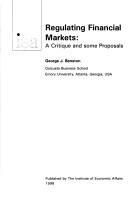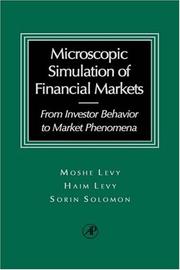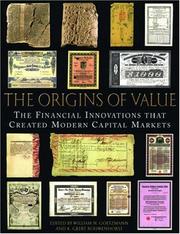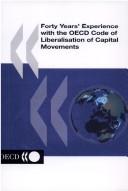| Listing 1 - 10 of 25 | << page >> |
Sort by
|

ISBN: 0255364156 Year: 1998 Volume: 135 Publisher: London : IEA,
Abstract | Keywords | Export | Availability | Bookmark
 Loading...
Loading...Choose an application
- Reference Manager
- EndNote
- RefWorks (Direct export to RefWorks)
Capital market. --- Marché financier --- Capital market --- 332.041 --- Capital markets --- Market, Capital --- Finance --- Financial institutions --- Loans --- Money market --- Securities --- Crowding out (Economics) --- Efficient market theory --- Marché financier
Book
ISBN: 8024609800 Year: 2004 Publisher: Prague Karolinum
Abstract | Keywords | Export | Availability | Bookmark
 Loading...
Loading...Choose an application
- Reference Manager
- EndNote
- RefWorks (Direct export to RefWorks)
Finance --- 332.041 --- 333.101 --- 333.600 --- CZ / Czech Republic - Tsjechië - Tchéquie --- Funding --- Funds --- Economics --- Currency question --- Banksysteem en bankstelsel --- Financiële markten. Kapitaalmarkten (algemeenheden) --- Czech Republic --- Economic policy. --- Private finance

ISBN: 0124458904 9786612284816 1282284819 0080511597 9780124458901 9780080511597 9781282284814 6612284811 Year: 2000 Publisher: San Diego : Academic Press,
Abstract | Keywords | Export | Availability | Bookmark
 Loading...
Loading...Choose an application
- Reference Manager
- EndNote
- RefWorks (Direct export to RefWorks)
Microscopic Simulation (MS) uses a computer to represent and keep track of individual (""microscopic"") elements in order to investigate complex systems which are analytically intractable. A methodology that was developed to solve physics problems, MS has been used to study the relation between microscopic behavior and macroscopic phenomena in systems ranging from those of atomic particles, to cars, animals, and even humans. In finance, MS can help explain, among other things, the effects of various elements of investor behavior on market dynamics and asset pricing. It is these issues in parti
Investments --- Capital market --- Mathematical models --- Computer simulation --- Financial organisation --- Operational research. Game theory --- 336.76 --- -Investments --- -Capital market --- -332.041 --- 336.76 Beurswezen. Geldmarkt. Valutamarkt. Binnenlandse geldmarkt. Valutamarkt --- Beurswezen. Geldmarkt. Valutamarkt. Binnenlandse geldmarkt. Valutamarkt --- Capital markets --- Market, Capital --- Finance --- Financial institutions --- Loans --- Money market --- Securities --- Crowding out (Economics) --- Efficient market theory --- Investing --- Investment management --- Portfolio --- Disinvestment --- Saving and investment --- Speculation --- 332.041 --- Computer simulation. --- Mathematical models. --- Investments - Mathematical models --- Investments - Computer simulation --- Capital market - Mathematical models --- Capital market - Computer simulation
Book
ISBN: 3428103203 Year: 2000 Volume: 15 Publisher: Berlin Duncker & Humblot
Abstract | Keywords | Export | Availability | Bookmark
 Loading...
Loading...Choose an application
- Reference Manager
- EndNote
- RefWorks (Direct export to RefWorks)
International finance --- Capital market --- Capital markets --- Capitaux à long terme [Marché des ] --- Financiële markt --- Financiële markten --- Kapitaalmarkt --- Marché de l'argent --- Marché des capitaux à long terme --- Marché financier --- Marchés financiers --- Market [Capital ] --- 330.05 --- 332.041 --- International monetary system --- International money --- Finance --- International economic relations --- Market, Capital --- Financial institutions --- Loans --- Money market --- Securities --- Crowding out (Economics) --- Efficient market theory
Book
ISBN: 9780470758984 Year: 2009 Publisher: Chichester Wiley
Abstract | Keywords | Export | Availability | Bookmark
 Loading...
Loading...Choose an application
- Reference Manager
- EndNote
- RefWorks (Direct export to RefWorks)
Money market. Capital market --- International finance --- Capital market --- 332.041 --- 333.600 --- AA / International- internationaal --- International monetary system --- International money --- Finance --- International economic relations --- Capital markets --- Market, Capital --- Financial institutions --- Loans --- Money market --- Securities --- Crowding out (Economics) --- Efficient market theory --- Financiële markten. Kapitaalmarkten (algemeenheden)

ISBN: 0195175719 9780195175714 Year: 2005 Publisher: Oxford Oxford university press
Abstract | Keywords | Export | Availability | Bookmark
 Loading...
Loading...Choose an application
- Reference Manager
- EndNote
- RefWorks (Direct export to RefWorks)
From the invention of interest in Mesopotamia and the origin of paper money in China, to the creation of mutual funds, inflation-indexed bonds, and global financial securities, here is a sweeping survey of financial innovations that have changed the world. Written by a distinguished group of experts--including Robert Shiller, Niall Ferguson, Valerie Hansen, and many others--and wonderfully illustrated with over one hundred color photographs of landmark financial documents (including the first paper money), The Origins of Value traces the evolution of finance through 4,000 years of history. Readers see how and why many of our most important financial tools and institutions--loans, interest rates, stocks, bonds, mutual funds, the corporation, and the New York Stock Exchange, to name a few--came into being. We see, for instance, how ancient Rome developed an early form of equity finance that resembles the modern corporation and read about the first modern corporation--the Dutch East India Company--and its innovative means of financing the exploration and expansion of European business ventures around the globe. We also meet remarkable financial innovators, such as the 13th century Italian Fibonacci of Pisa, whose mathematics of money became the foundation for later developments in the technology of Western European finance (and may explain why the West surpassed the East in financial sophistication). And we even discover a still-surviving "perpetuity" dating from the Dutch Age of Reason--an instrument that has been paying interest since the mid-17th century. Placing our current age of financial revolution in fascinating historical perspective, The Origins of Value tells a remarkable story of invention, illuminating many key episodes in the course of financial history.
Money market. Capital market --- Finance --- Money --- Value --- Capital market --- Speculation --- History --- History. --- 336.7 --- 338 <09> --- AA / International- internationaal --- 331.160 --- -Money --- -Value --- -Capital market --- -Speculation --- -332.041 --- Bucket-shops --- Commercial corners --- Corners, Commercial --- Gambling --- Commodity exchanges --- Contracts, Aleatory --- Investments --- Stock exchanges --- Capital markets --- Market, Capital --- Financial institutions --- Loans --- Money market --- Securities --- Crowding out (Economics) --- Efficient market theory --- Standard of value --- Cost --- Economics --- Exchange --- Wealth --- Prices --- Supply and demand --- Currency --- Monetary question --- Money, Primitive --- Specie --- Banks and banking --- Coinage --- Currency question --- Gold --- Silver --- Silver question --- Funding --- Funds --- Geldwezen. Kredietwezen. Bankwezen. Financien. Monetaire econonomie. Beurswezen --- Economische geschiedenis --- Financiële geschiedenis: algemeenheden. --- 338 <09> Economische geschiedenis --- 336.7 Geldwezen. Kredietwezen. Bankwezen. Financien. Monetaire econonomie. Beurswezen --- 332.041 --- Financiële geschiedenis: algemeenheden --- Finance - History --- Money - History --- Value - History --- Capital market - History --- Speculation - History

ISBN: 0273642324 Year: 1999 Publisher: Harlow : Pearson Education,
Abstract | Keywords | Export | Availability | Bookmark
 Loading...
Loading...Choose an application
- Reference Manager
- EndNote
- RefWorks (Direct export to RefWorks)
Computer architecture. Operating systems --- Distribution strategy --- Electronic trading of securities --- Stock exchanges --- -Capital market --- -332.041 --- Capital markets --- Market, Capital --- Finance --- Financial institutions --- Loans --- Money market --- Securities --- Crowding out (Economics) --- Efficient market theory --- Bulls and bears --- Commercial corners --- Corners, Commercial --- Equity markets --- Exchanges, Securities --- Exchanges, Stock --- Securities exchanges --- Stock-exchange --- Stock markets --- Capital market --- Speculation --- Online investing --- Online trading of securities --- Screen trading (Securities) --- Trading of securities, Electronic --- Online stockbrokers --- Data processing
Book
ISBN: 9780199585496 0199585490 Year: 2013 Publisher: Oxford Oxford university
Abstract | Keywords | Export | Availability | Bookmark
 Loading...
Loading...Choose an application
- Reference Manager
- EndNote
- RefWorks (Direct export to RefWorks)
The book presents models for the pricing of financial assets such as stocks, bonds, and options. The models are formulated and analyzed using concepts and techniques from mathematics and probability theory. It presents important classic models and some recent 'state-of-the-art' models that outperform the classics.
Investment management --- Capital assets pricing model --- AA / International- internationaal --- 305.91 --- 339.42 --- 380.1 --- 332.6 --- 332.041 --- Capital asset pricing model --- CAPM (Capital assets pricing model) --- Pricing model, Capital assets --- Capital --- Finance --- Investments --- Econometrie van de financiële activa. Portfolio allocation en management. CAPM. Bubbles. --- Financiële analyse. --- Waardeleer. --- Mathematical models --- Econometrie van de financiële activa. Portfolio allocation en management. CAPM. Bubbles --- Financiële analyse --- Waardeleer --- Capital assets pricing model. --- Mathematical models.

ISBN: 9780226320991 0226320995 9786613250308 1283250306 0226321290 Year: 2007 Volume: 12 Publisher: Chicago University of Chicago
Abstract | Keywords | Export | Availability | Bookmark
 Loading...
Loading...Choose an application
- Reference Manager
- EndNote
- RefWorks (Direct export to RefWorks)
'The Pure Theory of Capital', F. A. Hayek's long-overlooked, little-understood volume, was his most detailed work in economic theory. Originally published in 1941 when fashionable economic thought had shifted to John Maynard Keynes, Hayek's manifesto of capital theory is now available again for today's students and economists to discover. With a new introduction by Hayek expert Lawrence H. White, who firmly situates the book not only in historical and theoretical context but within Hayek's own life and his struggle to complete the manuscript, this edition commemorates the celebrated scholar's last major work in economics. Offering a detailed account of the equilibrium relationships between inputs and outputs in an economy, Hayek's stated objective was to make capital theory& which had previously been devoted almost entirely to the explanation of interest rates& & useful for the analysis of the monetary phenomena of the real world.& His ambitious goal was nothing less than to develop a capital theory that could be fully integrated into the business cycle theory.
Capital --- Capital. --- Investments. --- Interest. --- Investissements --- Intérêt (Economie) --- AA / International- internationaal --- 330.40 --- 338.03 --- Investments --- Interest --- 332.041 --- Interest and usury --- Finance charges --- Income --- Investing --- Investment management --- Portfolio --- Finance --- Disinvestment --- Loans --- Saving and investment --- Speculation --- Capital assets --- Fixed assets --- Economics --- Capitalism --- Infrastructure (Economics) --- Wealth --- Geschiedenis van het economisch en sociaal denken --- Evolution historique de la pensée économique et sociale: généralités --- History of the economic and social thinking --- 330.40 Geschiedenis van het economisch en sociaal denken --- 330.40 Evolution historique de la pensée économique et sociale: généralités --- 330.40 History of the economic and social thinking --- Geschiedenis van het economisch en sociaal denken. --- Kapitaal. --- Intérêt (Economie) --- Kapitaal

ISBN: 9264176128 9786610081219 128008121X 9264176187 Year: 2002 Publisher: Paris : OECD Publishing,
Abstract | Keywords | Export | Availability | Bookmark
 Loading...
Loading...Choose an application
- Reference Manager
- EndNote
- RefWorks (Direct export to RefWorks)
The OECD has actively promoted progressive liberalisation of current and capital account operations among its members for over 40 years. Since 1961, OECD countries have engaged in the opening of capital accounts, guided by the provisions and implementation procedures embodied in a unique multilateral instrument: the Code of Liberalisation of Capital Movements. While full freedom of capital movements was achieved by most OECD members more than a decade ago, and in some even earlier, new members (Korea, Mexico, Poland, the Czech Republic, Hungary and the Slovak Republic) have only recently attained the same level of liberalisation. This account of the accumulated OECD experience with capital account liberalisation provides timely and valuable reading for policy makers, academics and financial practitioners alike. Timely, as the debate on the pros and cons of external financial liberalisation by emerging markets is very active at the present juncture. Valuable, because the OECD experience clearly demonstrates the benefits of open capital accounts, as vouched for by the reluctance of its members to resort to restrictions on capital flows -- even in times of financial turmoil.
AA / International- internationaal --- 382.242.0 --- Capital movements --- Deregulation --- 332.041 --- Industries --- Regulatory reform --- Industrial policy --- Trade regulation --- Capital flight --- Capital flows --- Capital inflow --- Capital outflow --- Flight of capital --- Flow of capital --- Movements of capital --- Balance of payments --- Foreign exchange --- International finance --- Balans van het kapitaalverkeer: algemeenheden. --- Law and legislation --- OECD --- Organisation for Economic Co-operation and Development --- OESO --- OCDE --- Investments, Foreign --- International economic integration. --- Mouvements de capitaux --- Investissements étrangers --- Intégration économique internationale --- Droit --- International economic integration --- Common markets --- Economic integration, International --- Economic union --- Integration, International economic --- Markets, Common --- Union, Economic --- International economic relations --- Balans van het kapitaalverkeer: algemeenheden --- Law and legislation.
| Listing 1 - 10 of 25 | << page >> |
Sort by
|

 Search
Search Feedback
Feedback About
About Help
Help News
News